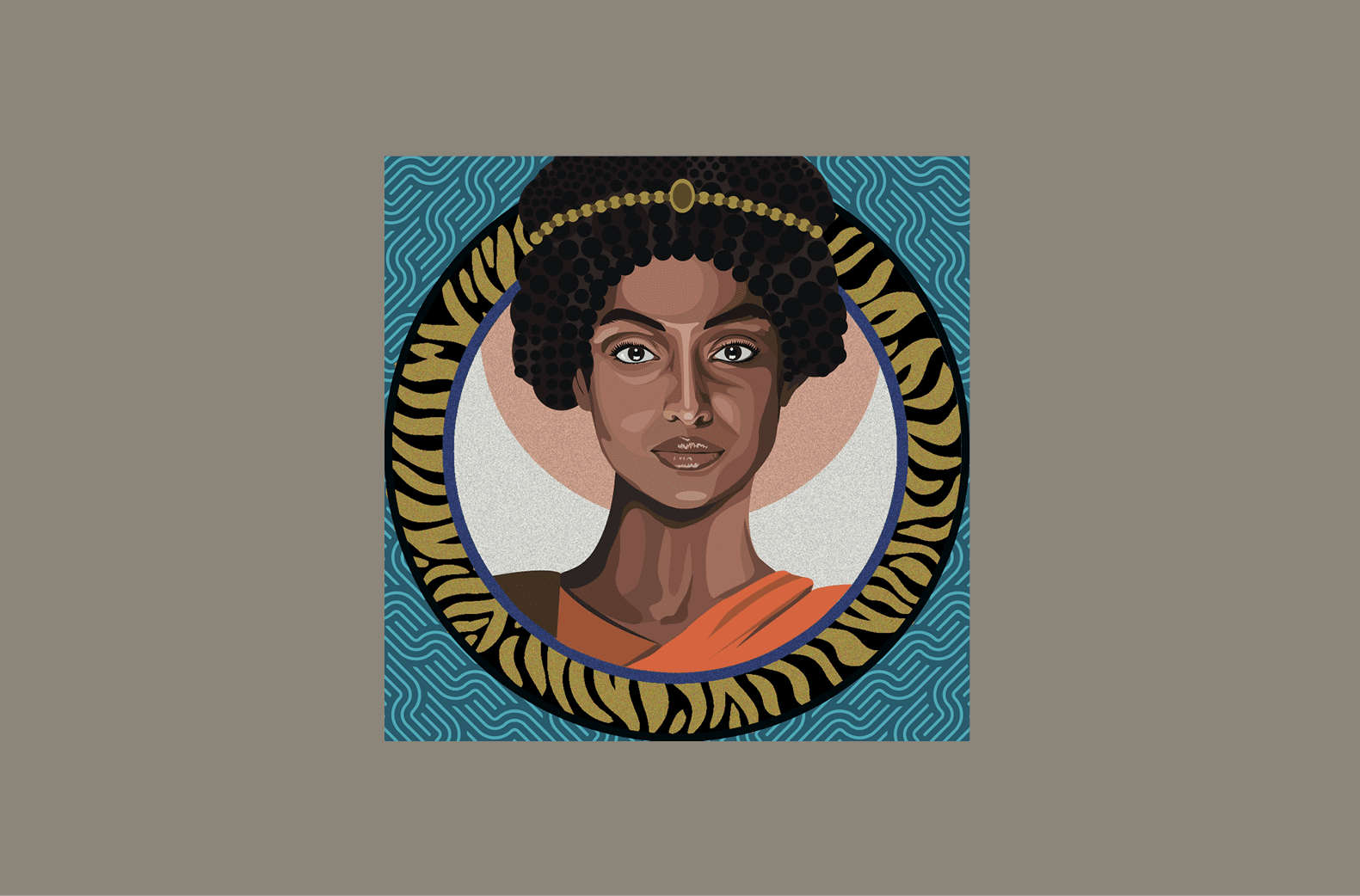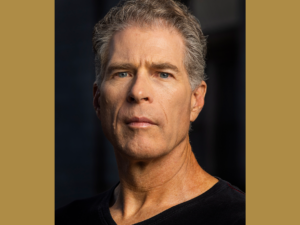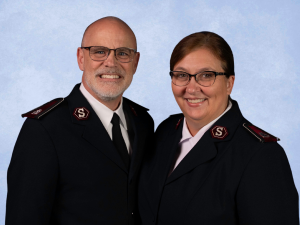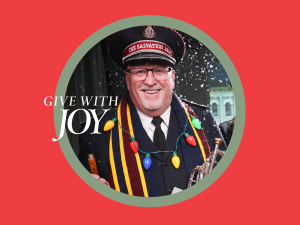Have you ever heard of Arsinoe? Or Salome? or Susanna? or Joanna? or Mary of Clopas for that matter?
These are just a few of the female disciples of Jesus who were well-known for their ministry in his day, yet we barely know of today.
Recognizing the inconsistency of how women were named in the gospels and how those stories were preserved helps us to understand just how ignored or suppressed the stories of women have been.
That’s why Cara Quinn started Know Your Mothers, a project that seeks to unearth the buried stories of Christian women over the centuries to reveal encouragement and fresh insight.
Cara spent 15 years working in advertising as an art director and designer, and graduated from Fuller Theological Seminary in 2019 with a master’s in theology. A mother herself, and a lover of church history, she set out to not only empower us today but to correct misunderstandings about how God equips women to lead in our midst.
The Know Your Mothers project features a different woman each week, diving into her story, personality and impact on the church…And in this episode, Cara shares a name I’ve never heard.
Show highlights include:
- How Cara Quinn came to create Know Your Mothers.
- The problem she most wants to solve and why.
- Why Cara focused in on mothers of the Christian faith.
- How she hopes these stories will empower people.
- One of the “buried stories” she’s loved sharing.
- How motherhood shaped her own experience and approach to life.
- The resources that have shaped her own learning and how she finds them.
- What Cara has learned since launching Know Your Mothers.
- One thing you can do to take action for good today.
Listen and subscribe to the Do Gooders Podcast now. Below is a transcript of the episode, edited for readability. For more information on the people and ideas in the episode, see the links at the bottom of this post.
* * *
Christin Thieme: Cara, welcome to the Do Gooders Podcast today. Thank you so much for being here with us.
Cara Quinn: Thank you for having me.
Christin Thieme: Can you tell us a little bit about your story and how you got to where you are right now?
Cara Quinn: Yeah, definitely. I run something called Know Your Mothers, which is a daily Bible study app, as well as an overarching project with a mission to uncover the buried stories of women in Christian history and in the Bible. For me, it was kind of this very big surprise to kind of start this as my main thing, because I went to seminary, I felt called to seminary. While I still had three young kids, I have four now, but at the time I only had three, and I worked full-time in advertising in New York City and my husband also worked full-time. We were already really busy. I felt God calling me to go to school to be a pastor. I was like, “What?” Like, “This doesn’t seem like this is the right life stage.” I kept putting it off. I was like, “Okay, in 10 years. In 10 years, I’ll do that.” I just felt this constant push, like, “No, it’s now. No it’s now.” And I was like, “Okay.”
I started going to Fuller Theological Seminary in 2015. The whole time, I didn’t really know what I was going to do. I knew I felt called to be a pastor. I knew that my skillset was unique in that I was an art director in advertising. My background was fine arts, my undergrad is in fine art. I knew that the way that God has always worked in my life, he kind of does these surprising things where he brings these connections together. I was like how is he going to bring together my advertising background, my fine art and illustration background, and a seminary degree together in a way that [inaudible] with a young family. That’s kind of led to where we are today, which is kind of this really beautiful picture of me being able to use and do life with all those things. That’s a really important part of my life.
Christin Thieme: It’s such an interesting mix.
Cara Quinn: Yeah, it’s definitely, I mean, a lot of the time I struggled with doubt, because I would be like, “How am I going to actually be in ministry with three kids?” Then, I found out I was pregnant with number four two quarters before I graduated. That was a big kind of almost blow because I was like, “Oh wait. I know the commitment that this takes to have a baby that first year or two.” It’s all-encompassing. He’s 18 months now. Really, I think his, like the news of his pregnancy really kind of helped me seek God more deeply for what it was exactly he wanted me doing with what my burdens were.
I think my main burden, like emotionally and spiritually, was seeing so many women in the church not stepping into their callings because they were either afraid, didn’t feel like their voice was important or had been told in really subtle ways throughout their life that their voice wasn’t that important or were just feeling like they couldn’t do it for whatever reason. It just wasn’t something that they knew how to navigate because nobody was there encouraging them, or there weren’t enough women or people that had their backs to be able to step into what they felt called to do.
One of the things for me, I wrestled with some of those things while I was in seminary. One of the things that really jumped out to me was the women in the history of the church that had done such radical things, that had really moved Christianity forward, had really been the hands and feet of the church, but then also did really trailblazing things. Whether it was starting denominations or if it was the desert mothers, or if it was women who, in their very early, early days of the church, did really radical things through the power of the Holy Spirit that really changed people’s perception of women and changed people’s perception of who God was through the person of Jesus.
These stories really, there’s just so many of them that I was like almost just shocked. I was really concerned; why do we not know these stories? Why, especially the Protestant church, hasn’t even heard some of the names of these really interesting, lives of people, of saints and of people that have come before us and really even struggled with some of the same kind of problems that we have today, yet have found ways to overcome them, use their voice, and really make a mark. That’s kind of where I knew my heart was being pulled.
Then, with having a baby, having baby number four, I was like, “Okay, God, how am I going to do this? What do you have for me?” I launched this project in March of 2020, two weeks before all the world shut down. Spent most of my time just taking all the research I had been doing and writing an article and focusing on one woman a week, creating a portrait. With that portrait, trying to honor her identity and her voice through the image, visually, and then writing about her. That kind of went for about six months doing it that way. Then, I really thought like, “We have the same thing happening with women in the Bible. We have misunderstandings around who these women are. We confuse who these women are with each other. Or, we don’t know the full truth of who they were. We don’t have the historical knowledge behind them.” I mean, we know, but we don’t know. Historians know, biblical scholars know, but in general in the church, we don’t necessarily have that knowledge, because it’s not taught at all churches, especially when it comes to women.
Then, the interpretation of Scripture from the woman’s perspective that really can draw out issues related to women is not something we always receive on a Sunday when we’re learning. That led me and my husband both to create the daily study app, which we launched for Advent, like one week into Advent, because we were a bit late. Around the 1st of December, we launched this daily study app, which is only on a iPhone for now because my husband’s working on the Android. It keeps us, like for me, we still do a woman each week, and then we get into the scripture about that woman, or I follow the liturgical calendar when we’re not focusing on a specific scripture for the woman. It helps. There’s a study in it that helps you understand the woman from a different perspective each day, or highlight something about her each day. I feel like that’s been a beautiful way to stay grounded in spiritual growth when we’re learning about these women. That’s a very long explanation.
Christin Thieme: No, no. It’s such an interesting path on how you went from art director to seminary to now launching this project and with the mix of all of those skills and your training and everything, what would you say in your life is the problem that you most want to solve? Is it bringing these stories to life? Is that how you would describe it?
Cara Quinn: Yeah, I think that paired with correcting the injustice in the way that women have been treated in the church, or are in some areas of the church still mistreated or not valued as leaders. I think just correcting some of the misunderstandings of women in the history of the church, women in the early church, and just kind of really highlighting where we misunderstand, especially when it comes to what Jesus said about women and how Jesus treated women. I feel like there’s just a lot of misunderstandings in a lot of streams of Christianity. I think that we do ourselves a disservice and we’re not really fully seeing God as holistically as we can when we don’t have the perspective of seeing the truth behind women in the church. I think the problem that I see is just the lack of awareness that leads to injustice when it comes to how women are seen and treated.
Christin Thieme: With Know Your Mothers, you’ve focused in on mothers of the Christian faith. Can you give us a preview of one of these buried stories that you are now having the chance to share in this way?
Cara Quinn: Sure, definitely. It’s so funny, because I focus on a different woman each week, and I’m always completely enamored by this woman by the end of the week. I feel so passionate about each person. I’ll give you a highlight of one of my absolute favorites. Have you heard of Thecla from the acts of Paul and Thecla?
She’s still venerated in the Eastern church. I think the Roman Catholic Church and the Episcopal Church recognize her as a Saint. There’s a piece of the [inaudible] the Acts of Paul and Thecla was what it was called. It was written around 190 AD. Most of us in the West don’t really know her story that well, but she was basically an evangelist early, early on, and she was converted to Christianity when she heard Paul preaching out her window. She was very wealthy. Her family was wealthy. She was engaged and she had this whole life planned out for her. She converted to Christianity after several days of listening to Paul preach. She ended up, Paul got put in prison because he was causing so many issues. This was in Iconium, so Acts 13:51 is where you can find this time when Paul was preaching.
She ends up, she wants to abandon her life and follow Paul. What she does is she goes to prison with Paul to listen to him preach. Her family becomes outraged. Paul and her are both sentenced to death. Paul is able to escape it because the governor was won over by Paul’s preaching and Holy spirit moved him and Paul got sent free, but then Thecla had to be burned, because that was what happened when you betrayed your family. It was a very like honor-shame dynamic of she rejected her family, well she was going to be executed.
She actually, a miraculous storm appeared and the fire went out and then she was able to escape. She goes, and she finds Paul and she stays with him for a while. She learns from him and she travels with him and she becomes his disciple and she gained a lot of popularity in Antioch. Gets the attention of a leader. That leader who thinks she’s very beautiful tries to rape her. She tears his clothes and kind of dishonors him in her lack of willing to submit to him. Then she’s, again, sentenced to death. But she had become so popular in the town that the woman became so outraged at the way that she was treated and that she had become too important to them.
There was this huge thing when she was put in the arena with the beast to be killed because that’s how people were killed. They have all these sick animals like bears and lions and wild animals that they would put in these arenas that were not treated well. Then, they would sometimes be ill themselves, or they would kind of be starving and they would try to attack, they would attack these people. What ended up happening in Thecla’s case was a lioness licked her wounds and fought off the other beasts in the arena. That didn’t work. Then, they brought out, it says in the text, flesh-eating seals, which seals don’t eat flesh, so we don’t really know if they were seals or not. They probably weren’t seals, but some sort of water animal that apparently was very vicious. Then they’re struck, the seals were struck by lightning and they all die. Then she survives, and this actually becomes her baptism.
Christin Thieme: Wow.
Cara Quinn: It’s a very profoundly exaggerated, but exciting story. It’s [inaudible] is what they’re called. It’s like a story of a saint that’s probably been exaggerated at certain points, but the only reason it’s been exaggerated is to make the point of the faithfulness and of God’s power and of the Holy Spirit working in her life. There’s a lot more details of the story, but basically, she escaped again, she received a welcome into a family member of Caesar’s home, and then she becomes basically her daughter, and then she’s given funds to go and preach. She was in a woman’s home whose name is Tryphaena, and she ends up converting her whole household to Christianity and just becomes this evangelist for the rest of her life.
She was so important to the early church for centuries and centuries that archeologists are still finding artifacts, pottery that have her name and her sayings and her portrait, because she really was somebody who changed the way that women were seen as leaders in the church. She has been this really important figure for the early church for a long time. She kind of started to get forgotten around medieval times, which is actually when a lot of women’s stories disappeared. We still have a lot, but a lot have kind of been buried that were really important to the Christian Church up until the middle ages. That’s just one very fun one that I love. Of course, there’s so many more stories of women.
Christin Thieme: That’s incredible. Don’t let anyone tell you that history is boring.
Cara Quinn: I know, right?
Christin Thieme: It’s amazing that I at least haven’t heard that story before. It’s incredible. Thank you for bringing these stories to light. I mean, with stories like hers and all the others that you’re featuring, what are you hoping that they do for people?
Cara Quinn: Yeah, that’s a good question. I think in general, just be an encouragement and helping us see the church as the global church and as a history of the church as all really important parts of our faith. God is the God of our world and he is over all of these churches and is revealing himself to different cultures and different ways. When we are able and willing to look at these stories through the perspective of different lenses, we’re being enriched and being able to see God more fully. I think it’s really beautiful to not only see these women’s stories through their lenses but also seeing how other church traditions have been encouraged in their faith through these stories. I think in general, just encouragement and then just like becoming more open to God’s grandness and bigness and like the potential of what we can do with our lives by being encouraged by these stories.
Christin Thieme: Yeah, absolutely. In your own experience, how has motherhood shaped your approach to life?
Cara Quinn: That’s such a good question. Yeah. I think primarily for me right now, especially with COVID kind of having been such a big part of this last year with four kids at home that I’m homeschooling and doing Know Your Mothers, it’s time. It comes down to my awareness of the value of time and trusting God with that time. Because it’s just, it’s so hard. My whole thing is I just never have enough time, yet I feel called to do this thing and I feel called to my family and I feel called to love others well. How I do that is through surrendering time and just being like, it’s such a commodity that it’s like I can’t do anything unless you show me, God. Give me the wisdom to know how to use my time. Because I want to be faithful. I’m not saying no to the work I’m doing. I also need to make sure I’m caring for myself and caring for others. I think the thing that has shaped, yeah, it’s just been trusting God with time.
Christin Thieme: Hard to do, but yeah, definitely.
Cara Quinn: Yeah. It became kind of like a survival thing this year too. I’m like, “I can’t do anything.” Like what do I do?
Christin Thieme: Right. Exactly. As part of that time with this project and having been through seminary, I imagine that you do and have done a fair amount of research. What would you say in your own education, in your own studies now, what’s a resource that’s really encouraged you or some piece of advice you’ve heard that stuck with you along the way?
Cara Quinn: I think, for me, the most important thing has been learning how to find authors, like learning how to find the voices that aren’t necessarily mainstream or are, I’m going to give a perspective that isn’t necessarily the main perspective. I really love finding authors from different backgrounds, different cultures. I think paying attention to authors and who I’m reading has become like everything to me. Because again, back to time, I don’t have the time to read five books a week. If I’m going to be reading one book a week, I want to make sure, which is a lot, it doesn’t even happen all the time. I want to make sure that I’m reading people that are going to push my theology forward and are going to push my awareness of how I think about the world forward and not keep me in my box. I think that has been the best thing is like who are the authors I’m reading? Who am I following? Who am I learning from? So that I’m continuing to learn and I’m not just in an echo chamber.
Christin Thieme: How do you go about finding those authors?
Cara Quinn: That’s a good question. I think it starts with who I’m following on social media and what they are recommending. Then, I follow certain publishers as well to see what they’re promoting and what voices they’re elevating. Then, I think just in general, being a part of different groups, either if it’s on Facebook or if it’s on, mostly just Facebook, I’d say, like what people are doing. There’s even some really great blogs of people that aren’t published, but they’re producing really great ideas and great work that are in a similar space to what I’m doing, but maybe they’re wrestling with a different aspect of it, but maybe not history, but like what do women do about overcoming purity culture, or what do women do about deconstruction or all these voices that I need to hear, because my perspective might not be that perspective, but I want to understand it more. Just starting to follow these groups so that I can kind of see what people recommend has been helpful.
Christin Thieme: What’s been surprising to you since you started this project or maybe something you learned you weren’t expecting.
Cara Quinn: I think the impact of Know Your Mothers pastorally has been really surprising, like the amount of people that have found me on social media or reached out over email that have just expressed the importance the work has meant to them spiritually has been a complete surprise because it’s easy for me to keep in my head sometimes and be like, “Oh, this is knowledge and it’s helpful. It’s empowering. It’s great.” I try, especially in the daily study, to be very pastoral.
I mean, we end every day in a prayer that I’ve written. It’s definitely a conscious part of the work, but to see how the Holy Spirit is using it to reach people’s hearts and help people with things that they felt were true, but didn’t know were true or just feeling seen, or opening their eyes to more compassionate for others. We did a series on Jezebel two weeks ago and that I got so much feedback from people that were like, “I’ve never thought of the story that way.” Just the way that it opened up people’s perceptions and highlighted assumptions and helped people to feel more seen and known has been really, really cool to see God using it that way.
Christin Thieme: I love that. What’s one tangible tip that you have on how we can better know our mothers today?
Cara Quinn: Yeah. I think that comes back to what we’re listening to, what we’re reading, what we’re exposing ourselves to, and how we’re learning and growing. I think one of the big reasons I started Know Your Mothers was because there wasn’t one go-to resource for stories about women in the Church and the history of the Church or the Bible. I really felt we needed that. For this mission of making those stories known for the empowerment of people today in the Church, I think finding those resources that are going to help you grow and help you be challenged and help you feel seen and known and loved and help you love others better by the diversity of voices you’re listening to, I think is the main action tip I would say that would help in this mission would be just seeking out diverse voices to help people thrive where they are.
Christin Thieme: Start with Know Your Mothers. Cara, tell us where we can find you and Know Your Mothers online.
Cara Quinn: Yeah. Definitely follow me on Instagram at my name. I’m so bad at Twitter. I need to get better at it. My husband makes fun of me constantly because I’m so visual and I’m so wordy, so Twitter is not good for either of those things, but definitely on Instagram, you can find me on Instagram at Know Your Mothers. Then, my app is on Apple’s app store and it’s just called Know Your Mothers. It’s a daily Bible study. It’s free for the first 30 days. Then, it’s 2.99 a month. Even if you don’t get the subscription, I still make about three days a week free, so you can still get stuff out of it. We’re constantly evolving that and we’ll have Android out soon. I’m really excited because that will mean we can all do it together as a community. Right now, for Lent, because it’s such an important study we’re doing, I’m offering the Lent study over newsletter, but it’s also just going to be ending in a couple of weeks. I would definitely download the app if you can.
Christin Thieme: Excellent. Thank you so much, Cara. Thanks for being here today and thank you for sharing more about this project and for the work that you’re doing to bring these voices to light.
Cara Quinn: Awesome. Thank you so much for having me. It’s been fun.
Additional resources:
- Explore Know Your Mothers, a project that seeks to unearth the buried stories of Christian women over the centuries to reveal encouragement and fresh insight.
- Read more about Thecla, a fearless apostle, from Know Your Mothers.
- Listen to Episode 79 on a truly biblical view of womanhood with Dr. Beth Allison Barr.
- Get support from moms who are right there with you. Join the Caring Moms Collective and find a place of low-pressure, high-encouragement love anytime you need it, whether you know it or not.
Listen and subscribe to the Do Gooders Podcast now.












